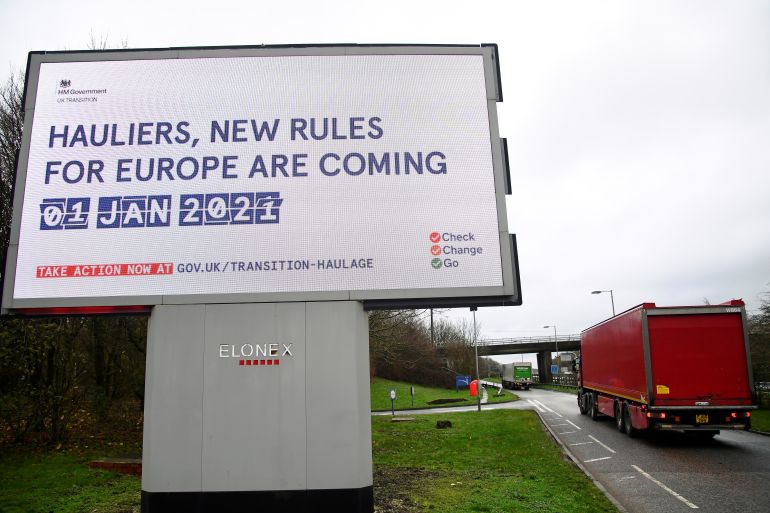‘Knockout blow’: UK manufacturers warn of no-deal Brexit upheaval
UK businesses plead with government for time to prepare for possibility of an exit from the EU without a trade deal.

The United Kingdom’s manufacturing industry warned of a potential “knockout blow” if Prime Minister Boris Johnson is unable to secure a trade deal with the European Union before temporary transition arrangements end on December 31.
Make UK, the trade body for British manufacturers, said it was slashing its growth forecast for the sector in 2021 to 2.7 percent from 5.1 percent just three months ago – roughly half the rate of growth it sees for the broader economy.
Keep reading
list of 4 itemsFood prices to spike without EU trade deal, warn UK retailers
‘Very, very likely’: UK, EU anticipate no-deal Brexit finale
UK navy on standby to protect fishing in case of no-deal Brexit
“Combined with the pandemic, many in industry are feeling like an exhausted boxer in the final round of a bout, with a ‘no deal’ exit from the EU potentially landing a knockout blow,” Make UK’s Chief Executive Officer Stephen Phipson said.
Official data last week showed that British factory output in October was 7.1 percent below its level a year earlier.
British manufacturers will face tariffs and quotas on many of their exports to Europe from January 1 without a trade deal, as well as regulatory hurdles.
Imports have already been disrupted due to high volumes of traffic at ports, linked to COVID-19 and Brexit-related stockpiling, prompting carmaker Honda to suspend operations temporarily last week due to parts shortages.
Make UK said its members expected output to stagnate or fall slightly over the coming quarter – better than the record drops seen in previous quarters due to the pandemic, but overall an anaemic picture.
“It is going to be a long haul back, with talk of a ‘V’-shaped recovery nothing more than fanciful,” Phipson said.
Another shot
Johnson and European Commission President Ursula von der Leyen on Sunday gave negotiators another shot at reaching a deal on the terms of trade before the Brexit transition period ends.
Lobby groups responded with relief at the prospect that the sides may yet avoid a no-deal divorce.
The raft of changes that Brexit nevertheless entails – from licencing standards to paperwork requirements – mean British companies still have a lot of work ahead to adjust to their new relationship with the nation’s biggest trading partner.
“Government must move with even more determination to avoid the looming cliff edge of January 1st,” Tony Danker, director-general of the Confederation of British Industry, said in a statement. Measures must include “negotiated grace periods to allow firms to adjust to either deal or no deal.”
British and EU negotiators will try to forge a deal over the next few days, and if talks make progress, it is possible an agreement could be struck by the middle of the week, people on both sides said. Still, the extent of the preparation needed has spurred business lobbies to ask the government not to rush them.

Though the UK voted to leave the EU more than four years ago, trade talks have come down to the wire as politicians haggle over key issues like fisheries. Companies, meanwhile, have to try to adapt for life beyond December 31 without knowing the fundamental rules of engagement.
“I think everything that can be said has been said – it was never, ever going to be easy,” said Mark Price, a former trade minister and past deputy chairman of the John Lewis Partnership, a large British retail chain. “This is about politics now. It is very difficult for business.”
Price’s concerns were echoed by Ruby McGregor-Smith, president of the British Chambers of Commerce. Officials have yet to decide how companies should deal with new bureaucratic headaches, such as the need to comply with rules of origin, or how to handle differing product standards.
‘Difficult to be ready’
“It’s very difficult to be ready because there are a number of areas where we don’t have any detail at all,” McGregor-Smith told Sky TV’s Sophy Ridge on Sunday programme. “I would urge the government to look at the support all businesses need as we come out of this and also give us more time to prepare as we leave the European Union.”
The pandemic makes preparation all the more challenging, she added.
Stockpiling in response to COVID-19 is already creating delays at ports on both sides of the English Channel. Swedish furniture retailer Ikea issued a statement on Sunday apologising to customers experiencing difficulties due to shipping logjams.
“Our supply chain – including the ports and goods terminals where our products are received – has been impacted by the effects of COVID-19, and our product availability has been affected as a result,” a spokesperson said in a statement. “These continue to be extraordinary times and we apologise unreservedly for the inconvenience caused to our customers.”
If the negotiations fail, the two sides would revert to commercial rules set by the World Trade Organization, which would mean new tariffs and customs controls. The resulting higher prices would lead to reduced volumes and production, according to Graham Biggs, a spokesman for BMW AG, the German luxury carmaker.
Retailers are building up stores of products from toilet paper to canned goods in anticipation of January 1. Still, shops would have no choice but to pass on extra costs from new tariffs to customers, meaning “it will be the public that pay the price of this failure,” said Helen Dickinson, CEO of the British Retail Consortium.
“I am not really sure what the extension means – but it’s a good thing as it is too early to throw in the towel yet,” said Richard Walker, managing director of the UK supermarket chain Iceland Foods. “They just need to put ideology aside and push for a pragmatic deal.”